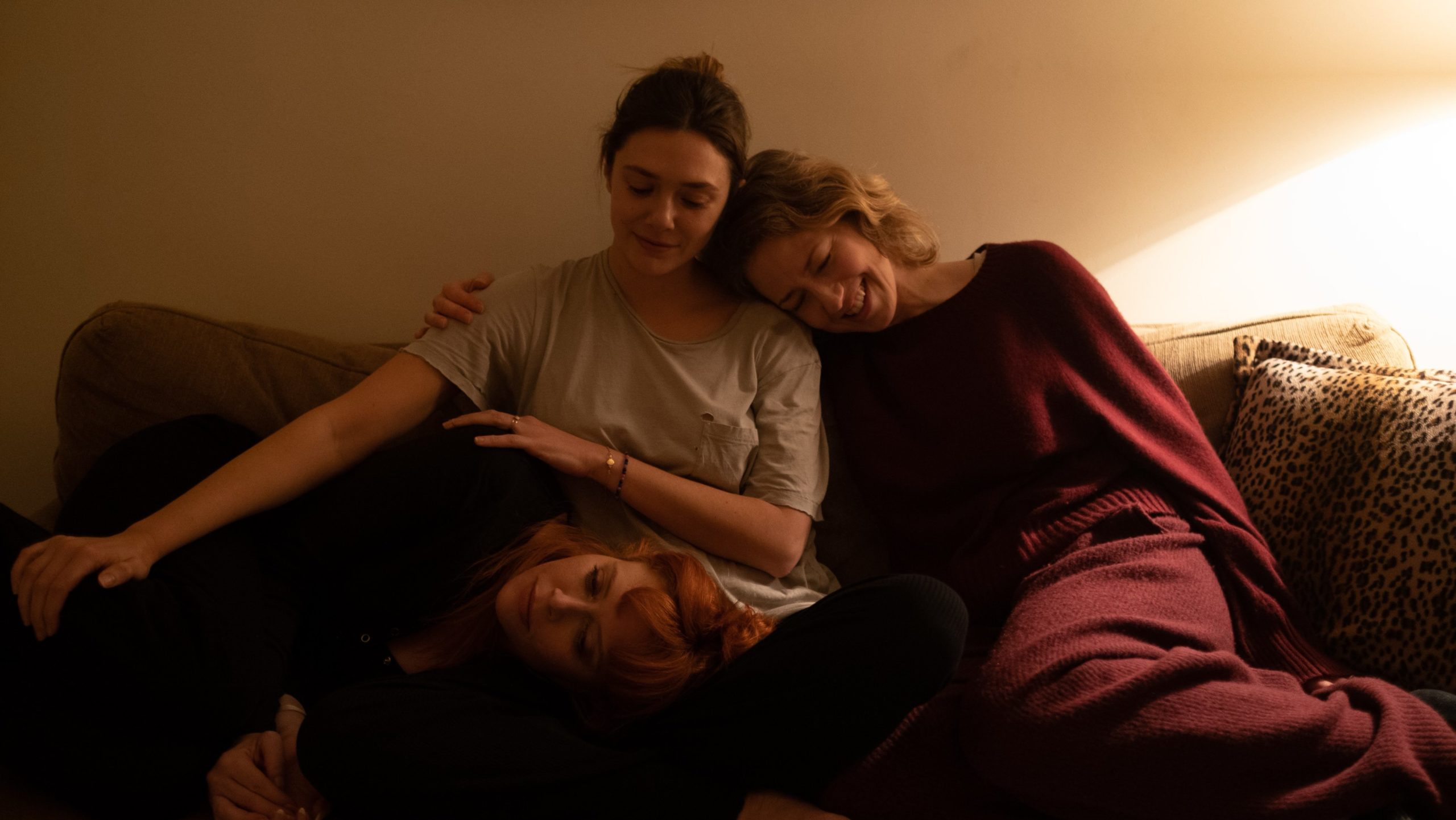
TIFF Review: His Three Daughters is a Powerful Family Drama
Absence is at the center of His Three Daughters, Azazel Jacobs’ latest film. It’s set almost entirely in a small New York City apartment as three sisters reunite to care for their ailing father in his final days, and Jacobs never lets us see inside his room. The camera stays largely in common areas where the three leads argue, cry, reconcile, and come to terms with living in a world where the one thing tying them together no longer exists. Barring some pisive final-act choices, it’s a powerful work with a smart screenplay and three terrific performances that capture the messy nature of families going through a grieving process.
Daughters starts with Katie (Carrie Coon), who delivers a monologue in the dining room to younger sister Rachel (Natasha Lyonne) about how they have to put aside their differences to get through the next several days. Katie’s points are practical and logical but her tone patronizing, as if she thinks she’s the only adult in the room, while Rachel agrees out of a need to shut her sister up (Rachel still lives at home, a fact that Katie uses to paint her as a spoiled freeloader). Enter Christina (Elizabeth Olsen), the more high-strung sister who’s visiting from across the country, acting chipper as she tries changing the topic to how she misses her husband and kid back home.
Katie’s forceful delivery and Christina’s overly chipper tone suggest His Three Daughters might suffer from performances that are too affected and theatrical, but Jacobs’ careful direction and clever writing lets each successive scene reveal information that upends any assumptions made in the prior. When we see Christina later on, alone on a phone call with her husband, her tone is more relaxed and natural (in a nice touch, the way she speaks to her sisters in the opening is more in line with the overly happy tone she uses on her infant daughter). More details about the sisters’ knotty pasts and relationships with each other seep out through dialogue, either between them or through phone calls with their friends and / or families, all of it done in a manner that feels organic rather than expositional.
That’s largely from the talents of Coon, Lyonne, and Olsen, all giving some of their strongest turns to date. Fans of Coon won’t be surprised to see her do well with a role where a hardened exterior slowly crumbles under the weight of emotions, while Olsen gets to reflex acting muscles after spending years in the Marvel Cinematic Universe. But it’s Natasha Lyonne who’s the surprise MVP. Rachel’s tendency to keep her emotions bottled up makes her suffer in silence as Katie constantly berates her––mostly requiring Lyonne to react in subtle, nuanced ways she nails perfectly. At one point, when Rachel’s friend Benji (Jovan Adepo) visits, he launches into a rant about how Katie and Christina treat her poorly, listing all the things she’s done to support her father over the months. The look Lyonne gives him, as if she’s doing all she can to hold back tears as he tells her everything she needs to hear, is heartbreaking, showing a range rarely seen in her past comedic work.
Jacobs and cinematographer Sam Levy, shooting on 16mm, utilize the confined spaces of the apartment where each sister can exist in their own orbit––usually Christina tending to her father off-screen, Rachel in her bedroom, and Katie on her own in the kitchen or living room––but their time together creates a cramped sensation that heightens tensions between them. There are some minor issues with His Three Daughters, like Benji’s character having a stagey presence in his brief appearance, or a disruption at the climax that’s largely unnecessary. But these moments don’t threaten to tank proceedings; they simply contrast with everything it achieves so well. Jacobs’ examination of this particular, charged situation embraces the sometimes-paradoxical nature of family relations, namely how intense emotions between loved ones can oscillate between love and hate at a moment’s notice. Jacobs’ understanding of these emotional truths––family ties finding ways to continually adapt, evolve, and mend in the most difficult circumstances––gives Daughters its power.
His Three Daughters premiered at the 2023 Toronto International Film Festival.
Grade: B








































![iFi's GO Bar Kensei Dongle DAC Supports K2HD Technology With Some Samurai Swagger [Updated] iFi's GO Bar Kensei Dongle DAC Supports K2HD Technology With Some Samurai Swagger [Updated]](https://i0.wp.com/cdn.ecoustics.com/db0/wblob/17BA35E873D594/33FF/45A11/QTXOLJR4xDKSNMMk2WlTgjaIlvSgcYpeU1xJzUwIoYs/ifi-go-bar-kensei.jpg?w=768&ssl=1)

































